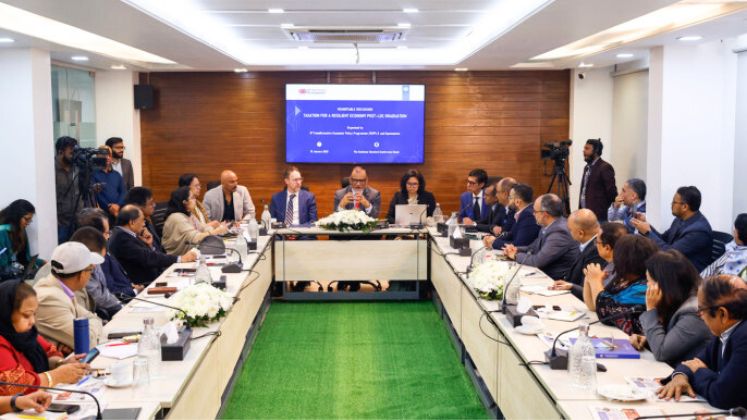
In a recent roundtable discussion hosted by the United Nations Development Programme (UNDP) Bangladesh, experts have called for a revamp of the country’s tax policies to better support small and medium-sized enterprises (SMEs) and female entrepreneurs, particularly those in the readymade garment (RMG) sector. The current tax framework has been criticised for favoring large businesses while failing to address the unique challenges faced by smaller entities and women-led initiatives.
During the event titled Taxation for a Resilient Economy Post-LDC Graduation, Sharmind Neelormi, who presented the keynote address, emphasized that tax exemptions predominantly benefit large corporations, especially those requiring substantial investments. Women, who make up a significant portion of the workforce in the RMG sector, often operate as low-wage laborers or small-scale investors, without access to the same resources and opportunities as their male counterparts.
Ferdaus Ara Begum, CEO of Business Initiative Leading Development, highlighted recent policy changes by the National Board of Revenue (NBR) that have increased the tax burden on small entrepreneurs, particularly women. The reduction of the annual turnover threshold from Taka 3 crore to Taka 50 lakh, along with an increase in the VAT rate from 4 per cent to 15 per cent, has placed additional strain on small businesses. She pointed out that only 8 per cent of companies registered with the Registrar of Joint Stock Companies (RJSC) currently pay taxes, underscoring the need for a more inclusive tax system.
The RMG sector, which employs approximately 60 per cent female workers, was specifically noted as a key area for reform. Selim Raihan, Executive Director of the South Asian Network on Economic Modeling (SANEM), questioned whether these women have truly become taxpayers over the past three decades, given that their wages often fall below the tax-free income threshold. He stressed the importance of enhancing women’s income and wealth to facilitate their inclusion in the tax net.
Experts argued for a more equitable tax system that simplifies compliance and supports the formalization of SMEs. They called for effective automation, fair enforcement, and a streamlined process for the swift refund of advance taxes to encourage more businesses to participate in the tax system. Stefan Liller, UNDP Bangladesh’s Resident Representative, emphasized that small and medium-sized businesses should be at the center of any tax reforms, as they are vital for job creation and economic growth.
The discussion also touched upon the significant trust gap and instances of harassment between businesses and the NBR. Md Alamgir, Secretary General of the Federation of Bangladesh Chambers of Commerce and Industry (FBCCI), called for the introduction of a single-window service for tax compliance, akin to Singapore’s streamlined trade system. Such a system would allow businesses to submit documents and payments online, potentially resolving many of the frustrations currently faced by entrepreneurs.
As Bangladesh approaches its target of graduating from Least Developed Country (LDC) status by 2026, experts cautioned that without substantial reforms to the tax system, the country may struggle to enhance its tax-to-GDP ratio, which remains one of the lowest in the world at 7.3 per cent. They urged policymakers to rethink tax exemptions and ensure that support is directed to those who genuinely need it, particularly small businesses and women in the RMG sector.






